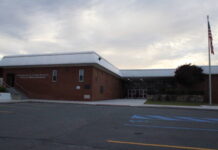Question
John C. Kehoe, publisher of the Sunday Dispatch, loved traveling to Orlando, Florida every year for a winter respite. But he also loved something he could participate in there that was prohibited in Pennsylvania. What was it?
1947 – 71 YEARS AGO
Banks nation-wide were moving to close their doors on Saturdays, affecting many workers who were paid at the end of the work week, leaving them nowhere to cash their paychecks. New Jersey adopted legislation permitting banks to close Saturday which prompted Pittston area banks to weigh in and support the closing. Many local workers feared that cash payment of wages would return which resurrected the practice of pay cars being dynamited and men held up on their way home while carrying their weekly pay. During the time of cash payments, it was reported that several murders and numerous violent attacks occurred. At that time, employers began issuing checks in lieu of cash payments. For years, it was common for banks to open on Saturday to enable workers to cash their paychecks. Many hoped that, if banks did close, that businesses would cash payroll checks at a discount. Those who opposed the banks closing were urged to contact their state representatives, senators and governor. Today, many banks are opened on Saturday until noon. Firstquarterfinance.com recommends switching to online banking and using ATMs in order to bank anytime of the day or night.
1952 – 66 YEARS AGO
The Loyalty Oath Act adopted by the Harrisburg Legislature required all municipal, school and state employees to swear they did not have any connection with subversive group’s intent on the overthrow of the United States government. Arrangements for ceremonies were published to facilitate the administration of the oath in communities throughout Greater Pittston. Senate Bill #27 outlining the Loyalty Oath was introduced on Jan. 15, 1951 by Senator Albert Pechan, and enacted as the Pennsylvania Loyalty Act in December of the same year. Although the Act’s effect on civil liberties was widely debated, the oath was required and, therefore, local cities and school districts conformed. The Loyalty Act was adopted during the McCarthyism Era. In Pennsylvania, however, the oath continued to be administered in most elections until 1975 when it was determined unconstitutional by then-Atty. Gen. Tom Corbett. The ruling only applied to state employees; it did not address the provision applied to political candidates. Florida and Pennsylvania still have optional loyalty oaths, but neither mentions communism.
1964 – 54 YEARS AGO
In the Sunday Dispatch’s “Ramblin’ Round Our Town” column, the following “Notes from the Dispatch Historian” were published.
• Hughestown gave two mayors and a chief of police to Pittston. The late Mayors William H. Gillespie and P.R. Brown and the late Chief of Police Edward Moran were Hughestown natives.
• J. Dewey Evans was one of the best mile runners in the state back in the mid-20s.
• Susquehanna Avenue in West Pittston was once a race track.
• St. James Episcopal Church was once located on Water Street on the site of the former VFW building.
• Dupont was once called Smithville; Avoca was once known as Pleasant Valley and Exeter as Sturmersville.
• The Friendly Sons of St. Patrick became a permanent organization in 1932.
• The late Mayor Ambrose Langan served as a city school director for 28 years.
• The Broad Street Garage was once a theatre known as The Broad, then the Princess and later the Strand.
• The first engine of the Lehigh Valley came to Pittston in 1867. The American Theater was built in 1923.
• Paul T. Bevan, of West Pittston, president of the First National Bank, served as a West Pittston school director for 18 years.
1970 – 48 YEARS AGO
To most West Pittston residents, Harry Schmaltz was the quiet unassuming owner of an established “building” business, but one weekend a month Schmaltz made the change to Lt. Colonel and would fly off to destinations unknown. Schmaltz began his flying career in 1942 as an aviation cadet in the Army Air Force. He went on to Italy flying combat missions in a P-51 Mustang until 1945. After the war, he joined the Pa. Air National Guard, commanding a C-121 Super G. Constellation. Although flying planeloads of supplies to airbases in Vietnam held great risk, one of his worst experiences was in Leopoldville, Africa during a political upheaval when armed men surrounded his plane. The situation was resolved and Schmaltz was able to return home. Schmaltz married the former Clara Herron, of Hughestown, and had four children, Harry W., Alan, Carol and Janet.
1972 – 46 YEARS AGO
The Pittston Area Junior High Mathematics Club, along with club coordinator Kenneth Zura, stood firm on their opposition to PA House Bill 1015 that would permit laboratory experiments on unclaimed or unlicensed animals. The club began a campaign against the bill by circulating posters and flyers. Students accumulated signed petitions and individual letters which were sent to state representatives, requesting they vote against the bill. A search of PA House Bills shows no evidence 1015 was enacted. The US Department of Agriculture oversees the treatment of research animals and other provisions of the Animal Welfare Act of 1966.
1980 – 38 YEARS AGO
The St. Mary’s eighth-grade girls basketball team, coached by Marlene Mariggi and Cathy Healey, finished their season with a perfect 12-0 record. Historically, the team “spawned” most of the area’s high school basketball talent with graduates such as Seton Catholic’s Ellen Gilhooley and Pittston Area’s Janet Sheerer. Starting line-up of the team consisted of Jackie Higgins, Kay McAndrew, Lynn McCutcheon, Patty Soy and Denise Scheller. Contributing to the success of the season were their teammates Maria Frew, Mary Jo George, Karen Cappelloni, Donna McDonald, Jeananne Haduck, Eileen Allardyce, Renee Tippett and Debbie Yuschovitz. In an article for Conde Nast Women’s Sports & Fitness Magazine, Sally Jenkins, senior contributing writer, wrote regarding women’s role in basketball: “In 1971, we were finally considered robust enough to play a full-court game, and in 1985, Senda Berenson became the first woman to make the Naismith Memorial Basketball Hall of Fame. Better late than never, I guess.”
1992 – 26 YEARS AGO
In the Sunday Dispatch column “On My Mind” written by Dick Cosgrove, James Baiera, of West Pittston, was the focus of a story highlighting his staunch support of the New York Yankees. A retired barber, Baiera recalled his first excursion along with friends Sam “Speed” Vullo and Tony Palma to Yankee Stadium in 1923. Each had $5 to cover their expenses for the day. Through the years, Baiera had seen Babe Ruth play, met Joe DiMaggio and received an autographed baseball from Yankee relief pitcher Joe Ostrowski, of Wyoming, which he later donated to a raffle to help children. The Yankees began their 1923 World Championship Season on April 18 as they opened Yankee Stadium. Babe Ruth christened the new stadium with a home run.
Answer
John C. Kehoe, publisher of the Sunday Dispatch, enjoyed the “sport” of cock fighting, which had been banned in Pennsylvania in 1863. In 1946, his prized roosters won the international cocking tournament in competing against the best chickens from all over the United States, Canada and Cuba. Kehoe’s chickens were known as some of the finest stock to be found anywhere. Kehoe’s uncles were said to have brought the strain of stock from Ireland 60 years prior and, over the years, had been carefully bred by the Kehoe family. According to animal protection websites, all states have banned the practice, but Oklahoma’s last sponsored tournament was held in 2002.
This day in history
1789 — The first Congress of the United States meets in New York and declares the Constitution in effect.
1791 — Vermont is admitted as the 14th state. It is the first addition to the original 13 colonies.
1793 — George Washington is inaugurated as president for the second time.
1797 — Vice-President John Adams, lected president on Dec. 7 to replace George Washington, is sworn in.
1801 — Thomas Jefferson becomes the first president to be inaugurated in Washington, D.C.
1861 — The Confederate States of America adopt the “Stars and Bars” flag.
1908 — The New York Board of Education bans the act of whipping students in school.
1952 — North Korea accuses the United Nations of using germ warfare.
Born on this day
1888 — Knute Rockne, football player and coach for Notre Dame
1901 — Charles Goren, world expert on the game of bridge
1932 — Miriam Makeba, South African singer





